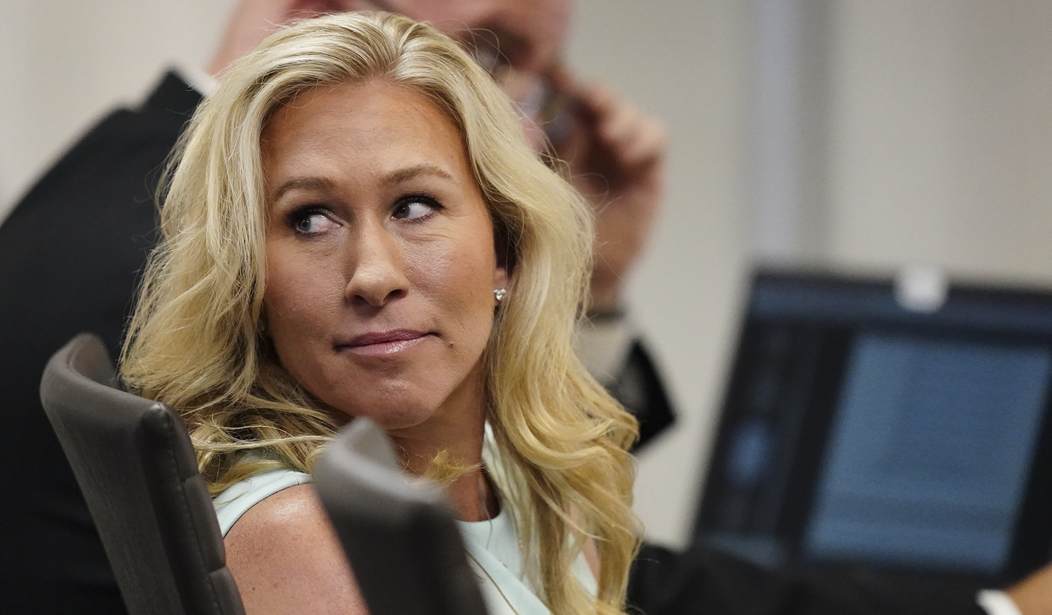Marjorie Taylor Greene is a singular politician -- a maverick, though not in the John McCain sense.
The Arizona senator was beloved by the media; MTG never was, at least until she started feuding with President Donald Trump.
On the contrary, her reputation in the press was as the poster girl for the GOP's conspiracy wing, the queen of Q Anon.
But it's not what sets her apart from other Republicans that makes Greene's resignation from the House -- effective Jan. 5 -- significant.
What the president and GOP leaders in Congress have to worry about is how typical she might be -- of legislators frustrated by what the future holds.
"This entire White House team has treated ALL members like garbage. And Mike Johnson has let it happen," a "particularly exercised senior House Republican" told Jake Sherman of Punchbowl News.
According to Sherman's unnamed source, "nearly all" Republicans in Congress -- "appropriators, authorizers, hawks, doves, rank and file" -- feel "run roughshod and threatened" by the administration, which doesn't so much as "allow little wins like announcing small grants or even responding from agencies," and "Members know they are going into the minority after the midterms" next November.
"More explosive resignations are coming," warns Sherman's informer.
Should such claims, posted by one journalist on X, be taken seriously?
The language might be hyperbole, but Congress is obviously not a happy place these days, even for the party in the majority.
Once Greene leaves, that majority will be down to five seats until her vacancy and others' are filled.
Greene won her last election by a two-to-one margin, so Republicans can be confident of holding her seat.
But in the interim an already virtually ungovernable House will be that much harder for Speaker Johnson to wrangle.
Midterms usually go poorly for the party in power at 1600 Pennsylvania Avenue, and Republican efforts to redraw red-state congressional maps to secure a few more seats have run into headwinds -- in the courts and in the form of blue states like California clearing the way for their own partisan redistricting.
So yes, Republicans are staring at the likelihood of losing the House in a year.
Though it's easy to scoff at, one thing that typically keeps members of Congress from despairing when they're facing minority status is their devotion to a cause, or at least a program:
For decades, for most Republicans, that cause was conservatism as Ronald Reagan understood it.
Trump does have a cause-or rather he is a cause-and he has a program which congressional Republicans mostly support.
But the president has never really made his party's legislators feel like partners in his effort: they're more a means to his ends.
And when Trump has deferred to Congress, as he did to some extent during his first term over attempts to "repeal and replace" Obamacare, the results have been a wreck.
Obamacare is still here, and the record-long government shutdown that ended mere weeks ago arose from Democrats holding the government ransom in an attempt to expand an extension of Obamacare subsidies.
The inability of a Republican president with a Republican Congress to overhaul the Affordable Care Act in 2017 set the stage for that agony this year.
And what's next?
With such a slender House majority, Trump doesn't want to depend on Congress to pass his agenda.
Meanwhile, House Republicans haven't had an agenda of their own for the last 25 years -- they've been happiest, and enjoyed their strongest majorities, when a Democrat has occupied the White House and they've played spoilers.
But three years ago, they suffered a crushing disappointment when they didn't get the kind of boost they expected from Joe Biden's midterms. They made gains but clawed their way to only a modest majority, not much bigger than today's.
Reagan is long gone, and nobody is quite sure what happens to Trumpism once Trump himself is no longer on the ballot.
How many Republicans in Congress want to stick around to find out?
The answer, in fact, is most of them -- but it wouldn't take many more choosing Greene's way out to throw control of the House into jeopardy well before next November.
The House isn't certain what the future holds for Trumpism, but without the House, Trump's own future may become a closed book, with no new chapters as he coasts to the end of his second term.
Neither the president nor his party can afford to call it quits this soon.
No matter how unruly the closely divided House might be, it's time the president tried governing with his party in Congress.
And it's time Republicans in Congress learned Trump's most important lesson -- to write their own destiny instead of echoing politics past.
Congress needs what Trump brought back to the presidency: daring and relevance.
Editor’s Note: Help us continue to report the truth about why America has a job crisis, and other critical topics that affect our lives and American culture.
Join PJ Media VIP and use promo code FIGHT to get 60% off your membership.









Join the conversation as a VIP Member